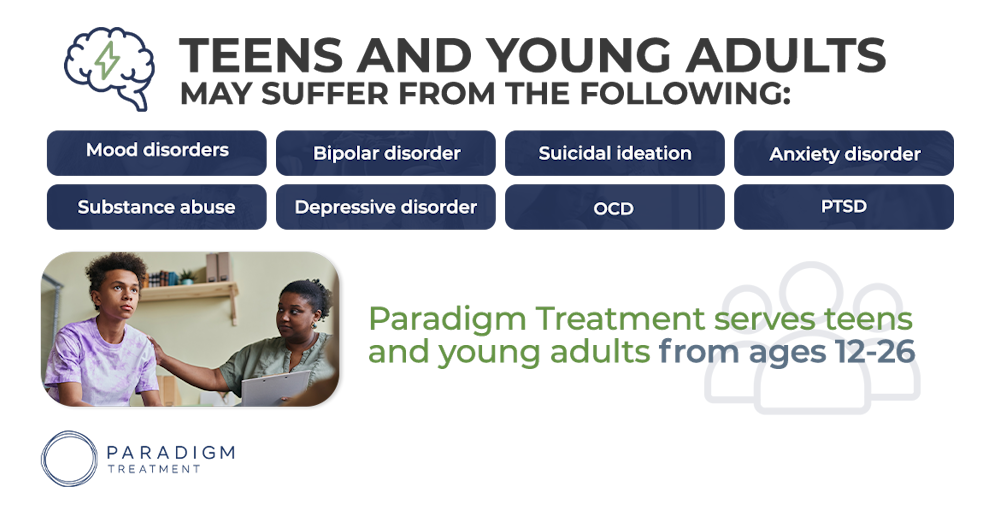Mental Health Programs for Struggling Young Adults and Teens (Ages 12-26)
Paradigm Treatment: A Holistic Approach to Mental and Behavioral Health
Paradigm Treatment offers specialized treatment programs for teens (12-17) and young adults (18-26) who grapple with mental, emotional, and behavioral health challenges. Our teen residential program has locations in Malibu (CA), San Rafael (CA), and Austin (TX) and our young adult program has locations in Malibu (CA) and San Rafael (CA).
Traditionally, residential treatment has centered on addressing behavioral issues. At Paradigm Treatment, we delve deeper to tackle the underlying core issues driving these behaviors. Our clients are bright and gifted individuals, yet they struggle with emotional regulation. They can exhibit heightened sensitivity to their environment and the well-being of others, often at their own expense. These struggles impact the day-to-day lives of our clients in numerous ways.
Rather than relying on punitive measures for behavioral change, we focus on an insight-oriented approach. Our goal is to empower and support these young people, teaching them healthier ways to manage and regulate their emotions. Instead of attempting to force change upon them, we guide them toward positive transformations. Our approach ensures that the progress our clients make extends beyond their time in treatment, continuing as they reintegrate into their homes and grow into responsible, empowered adults.
In today’s fast-paced world, younger generations face unique challenges. Access to information is abundant, and teens and young adults need internal skills to navigate this competitive landscape successfully. Paradigm Treatment is dedicated to preparing our clients for real-world scenarios, positioning both individuals and families for successful transitions back home.
Exclusionary Criteria: Prioritizing Group Well-Being
In residential, group settings, we always prioritize the collective well-being over any individual. Our stringent exclusionary criteria prohibit individuals who engage in violence, aggressive behaviors, or emotional bullying. We do not accept clients with a history of violence, sexual offenses, or placement from the justice system.



About Our Clients
Our clients come from diverse backgrounds and geographical locations. We recognize the intersecting identities of all our clients, understanding that adolescence and young adulthood are incredibly profound and impactful periods in anyone’s life. Despite their differences, all of our clients seem to share an acute need for heightened care in a safe, nurturing, and efficacious environment.
At Paradigm, we often say that we treat the bullied as opposed to the bullies, and that our program is built on the cornerstones of safety, reliability, efficacy, and trust. The troubled young adults and teens that need our help may be struggling at school or they may be at the top of their class. They could have incredible musical talent and robust social circles, or they may not have left their bedrooms in months.
Since we carefully tailor our treatment protocols to suit each and every client’s unique mental health needs, and although no two clients are the same, all our clients receive nothing BUT exceptional, effective care in our program.
Addressing the Challenges Seen in Teens and Young Adults
Here at our California mental health treatment center for struggling young adults and teens, we offer hope and help to those in need. We understand that young people struggle differently than older people do. We realize the needs young people have generally differ greatly from the needs older individuals have. As such, our facility provides programs for young adults and teens that address their specific needs.
We offer services for teens and young adults suffering from the following challenges:
- Mood disorders
- Bipolar disorder
- Suicidal ideation
- Anxiety disorder
- Substance abuse
- Depressive disorder
- Personality disorders
- Obsessive-compulsive disorder (OCD)
- Post-traumatic stress disorder (PTSD)
In addition to drug addiction and the mental health problems listed above, we treat troubled youth suffering from ADHD, anger issues, gender identity challenges, parental alienation, and issues related to divorce or adoption.
Importance of Treatment for Children, Teens, and Young Adults
Struggling young adults and teens need a nurturing environment where they can have access to support and guidance. Our programs for young adults and adolescents are more than just tools to help young people survive. They are programs that are built to help struggling young adults thrive.
A teenager or young adult displaying signs of mental challenges requires the right balance of treatment and therapy to help them improve their daily lives. Such care can increase the possibility of success when it comes to recovery.
Teenage and young adulthood years can be incredibly difficult. Young people encounter challenges such as low self-esteem, social anxiety, difficulty making friends, family problems, and more. Many times, a young person who is dealing with such struggles will find it hard to talk about his or her feelings. Expressing frustration can be difficult and, often, troubled youth end up exhibiting negative behaviors as a result.
When a child or young adult has difficulty addressing the underlying causes of such behavioral issues, they will likely only begin to feel worse. But, with the help of a professional teen and young adult treatment program, individuals can receive the support they need.
Young meant and women who struggle with mental challenges may not know how to talk to their parents or other adults in their lives. But, with the help of therapy, they can achieve success in the world of recovery, which will enable them to live a more mentally healthy life.
How Treatment Can Help
Professional treatment can help a teen or young adult live a happy, healthy, fulfilling life. It can help young individuals develop the confidence they need to keep moving forward. With such confidence, teens and young adults are bound to have a brighter future than they ever thought possible!
Treatment can also help people develop independent living skills and coping skills to use when challenges arise. These life skills will not only improve your child’s chances of successfully completing our treatment program, but they will also help your child or emerging adult thrive in the future!
Find Help for Struggling Young Adults and Teens at Paradigm Treatment
To be struggling with mental health issues at times when the pressures of life can already feel insurmountable is deeply challenging and difficult for many young adults and teens. We recognize just how hard this can be on our clients and their families. As such, we consider the families of our clients at Paradigm to be a vital component of the treatment process and by extension our program as a whole.
It is for this reason that we engage the families of our clients in individual and multi-family therapy sessions, and provide extensive education for parents as well, to assist them when their child returns home. For more information about how our program helps young men and women struggling with mental health problems, reach out to us today. Allow our programs to support the teen or young adult in your life.

Other Youth Mental Health Topics You May Find Helpful…
5 Tips to Start the New School Year Off Right
It’s the beginning of the school year and your teen is heading off to a new grade and possibly a new school. Getting the new school year off to a […]
Continue Reading8 Relaxation Techniques for Teens
Let’s face it: Life is stressful. Whether you’re a teenager, a young adult, a middle-aged adult, or a senior citizen, there are parts of daily life that are frustrating, annoying, […]
Continue ReadingWhat to Do When Teens Resist Treatment for Mental Illness
Not all teenagers are going to participate in treatment simply because its available to them. In fact, there’s an old joke in the mental health field: How many therapists does […]
Continue ReadingAn Overview of Psychotic Disorders in Teens
People who have psychotic disorders often begin showing symptoms during the late teenage years. Determining that your teen is having delusions, or false, fixed beliefs, can be difficult. After all, […]
Continue Reading
Lucy Nguyen is the Executive Director at Paradigm Treatment, overseeing all clinical treatment programs across the organization’s southwestern region. Her extensive experience includes working with young adults in private practice, serving as a therapist for children and teens with emotional and behavioral needs, and acting as a behavior interventionist for teens with developmental disorders. Lucy integrates cognitive-behavioral approaches with mindfulness and compassion in her work, and she is also EMDR-trained. She holds a Master of Science in Counseling from California State University, Fullerton, and a Bachelor’s degree in Psychology and Social Behavior from the University of California, Irvine.

